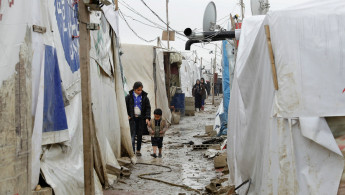Lebanese Army issues eviction orders to 10,000 Syrian refugees
Up to 10,000 Syrian refugees in Lebanon have been served eviction notices by the Lebanese army, ordering them to leave their informal settlements near an air force base in the Bekaa Valley, Lebanon's The Daily Star reported on Saturday.
The refugees affected by the order live in some 90 camps scattered across the villages of Dalhamiya, Riaq, Tannin al-Fawqa, Tanim al-Tahta and Hosh al-Ghanam.
They will be forced to relocate but it remains unclear whether a transfer plan has been set up by authorities in Lebanon.
"The army has issued eviction notices to more than 10,000 refugees in the Bekaa, without a clear plan for where they will go," Lama Fakih, deputy Middle East director at Human Rights Watch said.
"As Lebanese leaders in Brussels tout Lebanon's humanitarian achievements and call for more aid, refugees here are living in fear of losing their homes."
There are currently over 1.1 million Syrian refugees in makeshift camps across Lebanon - a country with the highest refugee per capita rate in the world.
Last week, Lebanon's Prime Minister Saad Hariri warned that his country had reached "breaking point" over pressures caused by refugees in Lebanon.
"This issue has reached a breaking point for us in Lebanon. We want the international community to hear us and understand that Lebanon is facing a crisis," Hariri said.
Since 2011, the Syrian crisis has seen nearly 500,000 people killed and 12 million people forced out of their homes in one of largest displacements of people since the Second World War.
In that time, more than 1.1 million Syrians sought refuge in neighbouring Lebanon.
With an open-door policy, the country initially welcomed many with open arms, allowing refugees to enter without a visa and to renew residence cards almost free of charge.
Yet as the crisis in Syria continued to unfold, refugees came to make up almost a fifth of the population.
Under local pressure, in January 2015 the Lebanese government passed rules that required Syrians to renew their residency permits with much stricter conditions. The new law inevitably rendered many illegal.
Citing security concerns, several local municipalities began curfews and crack-downs against Syrian refugees.
Today, an estimated 70 percent of refugees in Lebanon lack legal status, which among other problems limits their ability to work, access education and healthcare, or simply move freely without fear of being apprehended by police.





 Follow the Middle East's top stories in English at The New Arab on Google News
Follow the Middle East's top stories in English at The New Arab on Google News


